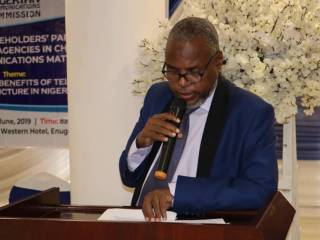Dare, represented by Alkasim Umar, Head Compliance Monitoring, NCC, stated this in a keynote address at the Regional Stakeholders Parliament held by NCC to engage with Relevant State Agencies in Charge of Telecommunications Matters, on 27 June, 2019 in Enugu.
Sunday Dare urged all licensees to comply with all legitimate tax and other obligations binding on them anywhere they operate, as compliance is a key element of the NCC’s Code of Corporate Governance. He also encouraged the agencies to address issues of multiple taxation which discourage investments and to avoid tampering with installations.
Sunday Dare said, “Telecoms Infrastructure are called ‘Critical National Infrastructure’ and this is why both the Miscellaneous Provisions section of the Criminal Justice Act, and the Cybercrime Act of 2015 both prescribe heavy penalties, including terms of imprisonment, for those who tamper with such infrastructure”.
In line with the theme of the event, the Commission had, in the past, reached a consensus amongst key stakeholders on six broad imperatives for optimizing the benefits of telecoms infrastructure in Nigeria, namely:
1) Uniform RoW rates and standardized review mechanisms applicable across all States;
2) Uniform approval processes and “One-stop-shop” agencies which will act as single interface for all site approvals and RoW within a State;
3) Dig-once policies to reduce cost of roll-out and protect roads and other public infrastructure;
4) “Zero interference” commitments to ensure that legal due process will be observed and adequate notice given before any enforcement action is taken against any service provider. Telecoms infrastructure must however never be tampered with;
5) SLAs with operators to ensure that issues are timeously resolved and;
6) Escalation processes for all operator misconduct, as well as effective dispute resolution mechanisms.
The Parliament was well attended by Mobile Network Operators, State Representatives of Agencies from across Abia, Anambra, Ebonyi, Imo, Enugu States and other relevant stakeholders in the Industry.
